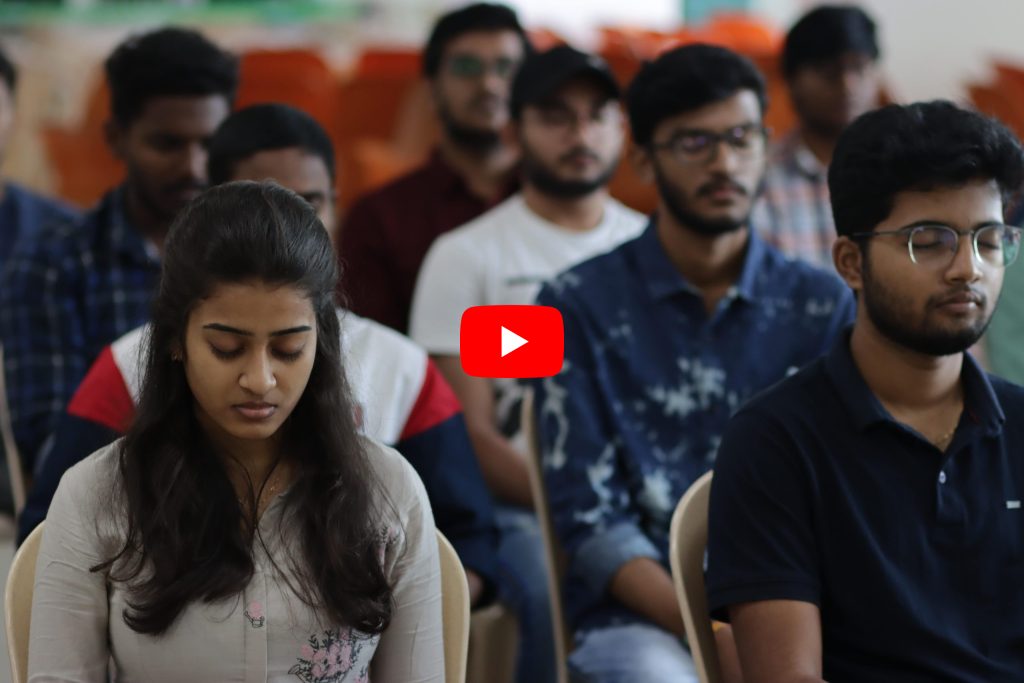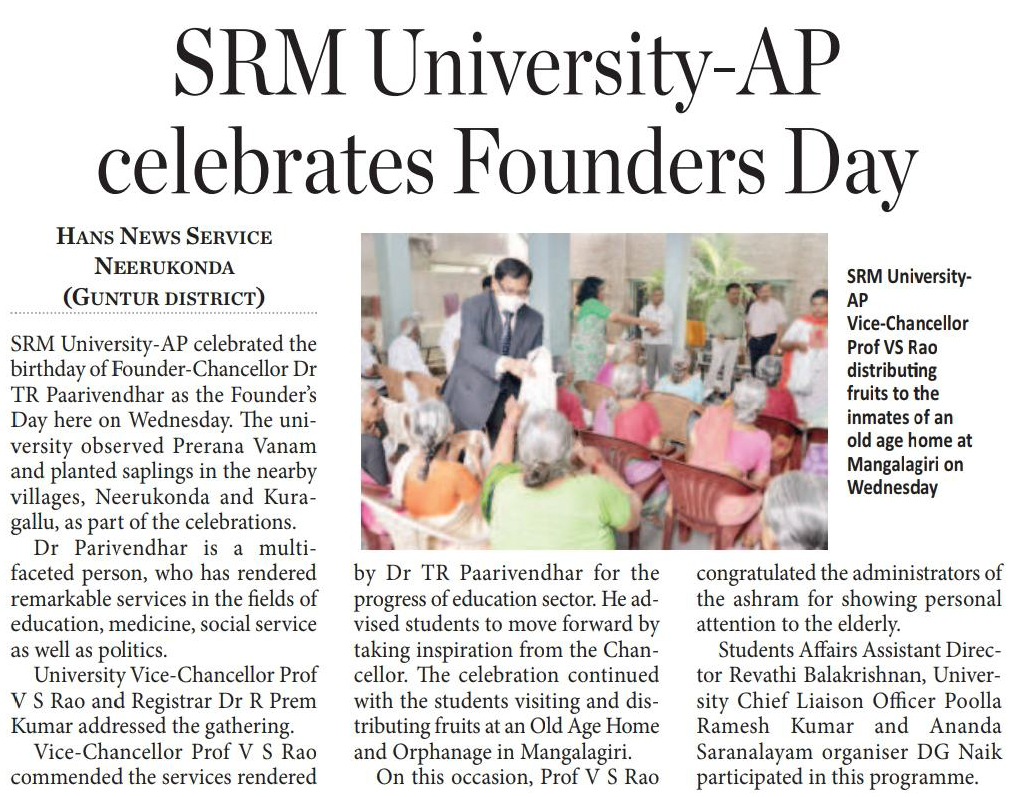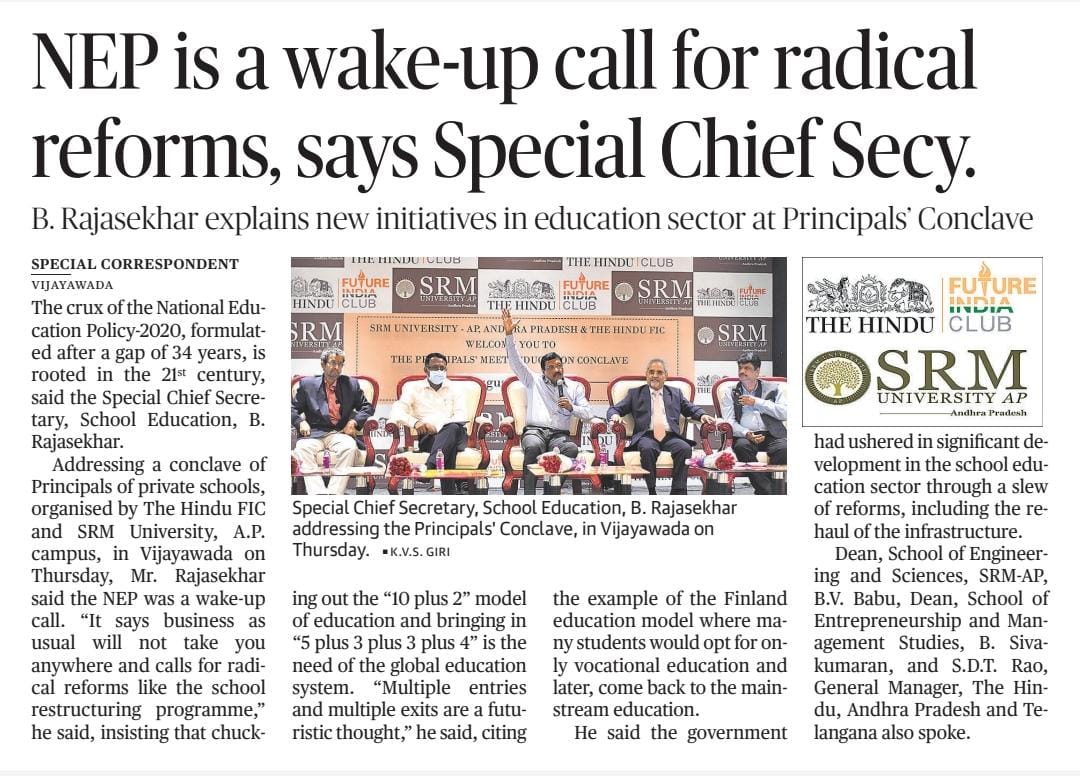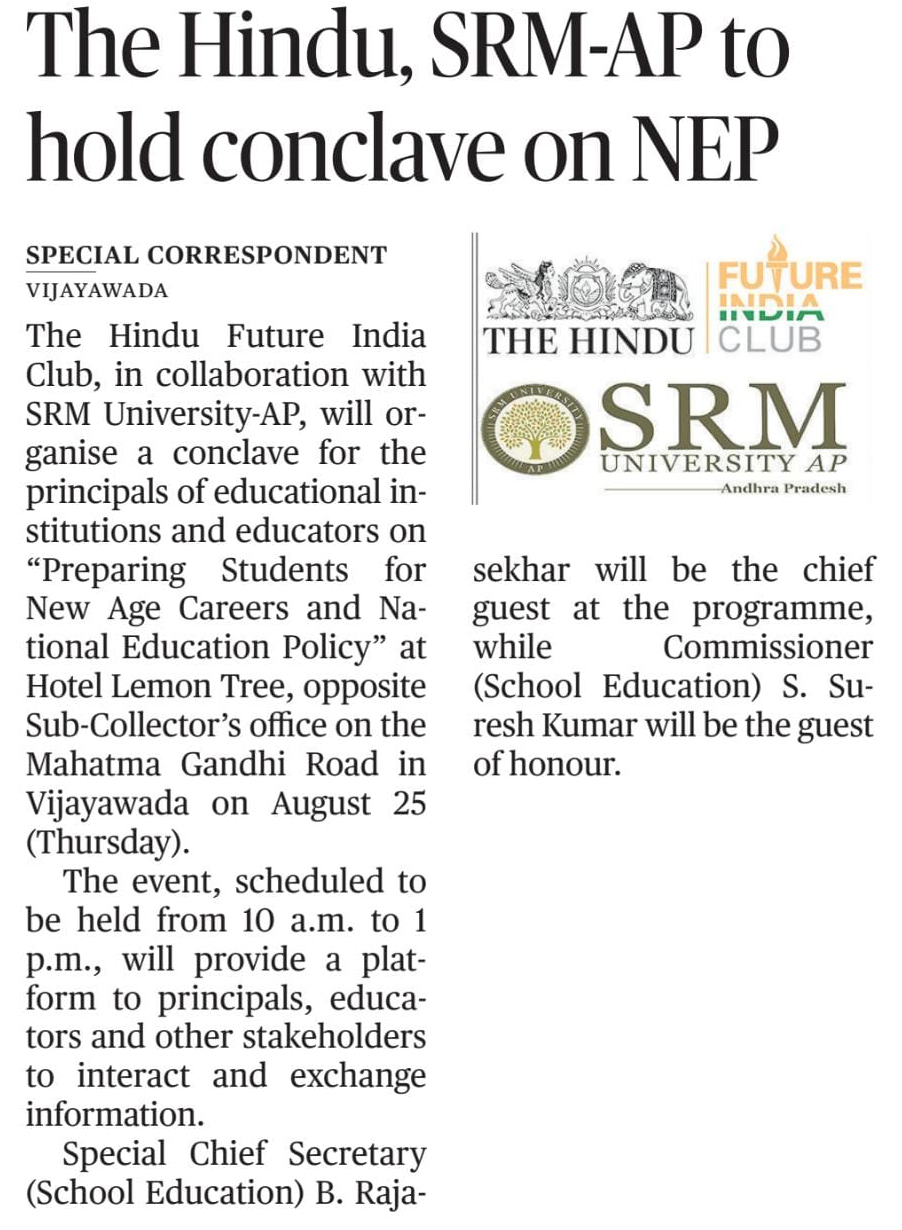All Management News
- Defect detection algorithms September 9, 2022
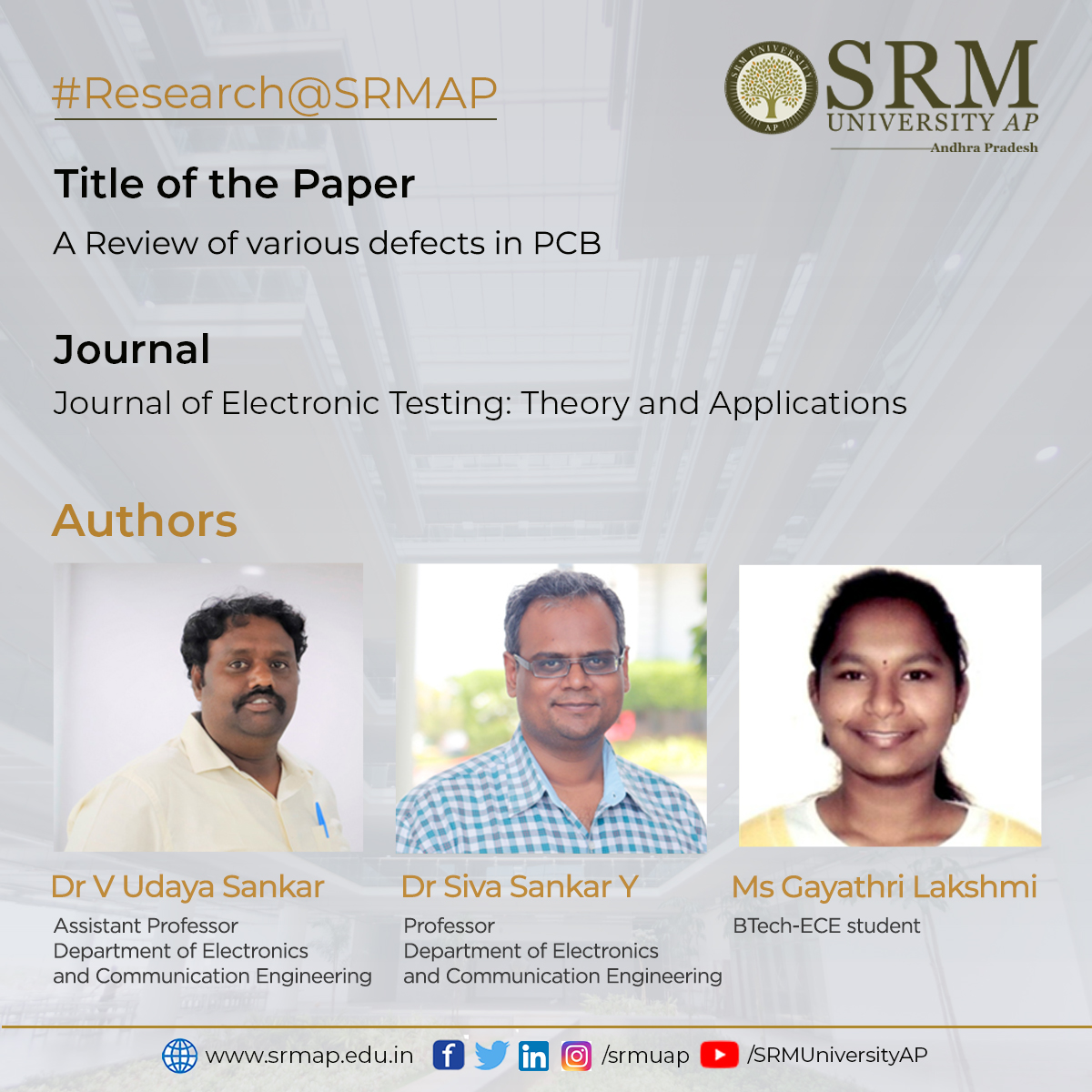 Research at the Department of Electronics and Communication Engineering is currently developing defect detection algorithms. Assistant Professor Dr V Udaya Sankar, Professor Dr Yellampalli Siva Sankar, and their BTech student Ms Gayathri Lakshmi have published a paper, A Review of various defects in PCB, in the Journal of Electronic Testing: Theory and Applications with an impact factor of 0.795.
Research at the Department of Electronics and Communication Engineering is currently developing defect detection algorithms. Assistant Professor Dr V Udaya Sankar, Professor Dr Yellampalli Siva Sankar, and their BTech student Ms Gayathri Lakshmi have published a paper, A Review of various defects in PCB, in the Journal of Electronic Testing: Theory and Applications with an impact factor of 0.795.Abstract
Printed Circuit Boards (PCBs) are the building blocks for all electronic products. Fabrication of a PCB involves various mechanical and chemical processes. As obtaining accuracy in the mechanical and chemical processes is very difficult, various defects/faults are formed during PCBs fabrication. These fabrication defects lead to performance degradation of electronic products. This paper describes multiple defects present in PCBs under the Through-hole and SMD categories. To understand the frequency of occurrence and reason for defects in both manual and machine, PCB fabrication data was collected and analysed from April 2017 to July 2020 as a part of industry collaboration.
The research is a review done on the defects present in PCB. Researchers surveyed various papers on PCB defects and their detection. Based on the literature review and information obtained from Efftronics systems Pvt. Ltd, they classified the defects, gave a detailed explanation for each, and provided some analysis of their occurrences.
While doing the literature review, researchers observed that no paper mentioned all the defects that can occur in the case of PCB fabrication. For this reason, they came up with this paper which provides detailed information regarding the defects. Information is also obtained from the industry. Comparing the defects can help focus on the critical defects for future research on defect detection methodology.
The project is done in collaboration with Efftronics Systems Pvt. Ltd. Through the partnership, the company supported sharing images, insights information related to defects and involved in discussions. Also, the company allowed visiting their premises to understand more about PCB defects. Researchers look forward to creating a prototype that detects all the defects mentioned in this paper for a given PCB.
Continue reading → - Studying the critical behaviour in physical systems through inequality analysis September 9, 2022
Dr Soumyajyoti Biswas, Assistant Professor from the Department of Physics, has been keenly involved in intense research around areas like the statistical physics of fracture and breakdown in disordered materials and machine learning methods in predicting the imminent breakdown in disordered systems. He has recently published two articles titled “Success of social inequality measures in predicting critical or failure points in some models of physical systems” and “Evolutionary Dynamics of Social Inequality and Coincidence of Gini and Kolkata indices under Unrestricted Competition” in the journals Frontiers in Physics and International Journal of Modern Physics C respectively. The research was done in collaboration with various academicians and undergraduate students (BTech CSE and BSc Physics) from the Indian Statistical Institute, Kolkata and Saha Institute of Nuclear Physics, Kolkata.
It is known that physical systems behave erratically near critical points. Since the 1970s, the ‘erratic’ behaviour has been explained in terms of critical phenomena, and it was found that there are some robust patterns in classes of systems, e.g., all liquid-gas transitions have something in common. Those common patterns were quantified in terms of critical exponents – some numbers that belong to a particular class of systems.
The research shows that if the ‘erratic’ responses of systems near critical points are quantified by some measures of inequality indices (higher the values of the indices, higher the inequality), then such indices behave in a near-universal way for different physical systems, even if they belong in different universality classes. The articles have shown such behaviour in models of physical systems. They have also shown that in socio-economic data, which are also the systems that were conjectured to be in the self-organized critical state. The behaviour from real data matches very well with those from the model simulations.
The researchers have tested their observations from the model simulations to various socio-economic systems that were long conjectured to be in the state of self-organized criticality. Specifically, they have looked into the income inequalities in the US, inequality in citations of authors, inequality in income from movies, and inequality in fluctuations of Bitcoin markets. In all these systems, the participating agents compete among themselves without much external intervention.
In fact, the only system among these where there are some interventions is income inequality. They have shown that through data from the IRS in the US, that inequality has consistently grown in the 1980s till date and has been following the path predicted in our model simulations.
In future, they plan on continuing along this line of looking at critical behaviour in physical systems through inequality analysis. Particularly for the systems where the critical point can represent a catastrophic event (say, fracture) and it is important to quantify the distance from such a catastrophic point.
Abstract of the Research
In many physical systems, experimentally measurable quantities vary drastically near the critical point of such systems. For example, in liquids turning into gas, the densities fluctuate, similar fluctuations happen for magnetisation near critical temperature. We have shown that in systems where the critical point is self-organized i.e., the system reaches the critical point on its own, the unequal nature of their responses show nearly universal trends, even if the models belong to different universality class. This observation could then be used in physical and also socio-economic systems, to quantify their distance from critical point.

Continue reading → The right hand side figure illustrates the variation of the inequality indices and the circle indicates the critical point where the system is evolving towards. On the left hand side, the picture presents the same indices for income inequality in the US. It has been observed that the inequality has grown over the years and tending towards the saturation value (about 0.86) in a very similar way that is seen in models.
The right hand side figure illustrates the variation of the inequality indices and the circle indicates the critical point where the system is evolving towards. On the left hand side, the picture presents the same indices for income inequality in the US. It has been observed that the inequality has grown over the years and tending towards the saturation value (about 0.86) in a very similar way that is seen in models. - Studying the agricultural transformation in Southeast Asia September 8, 2022
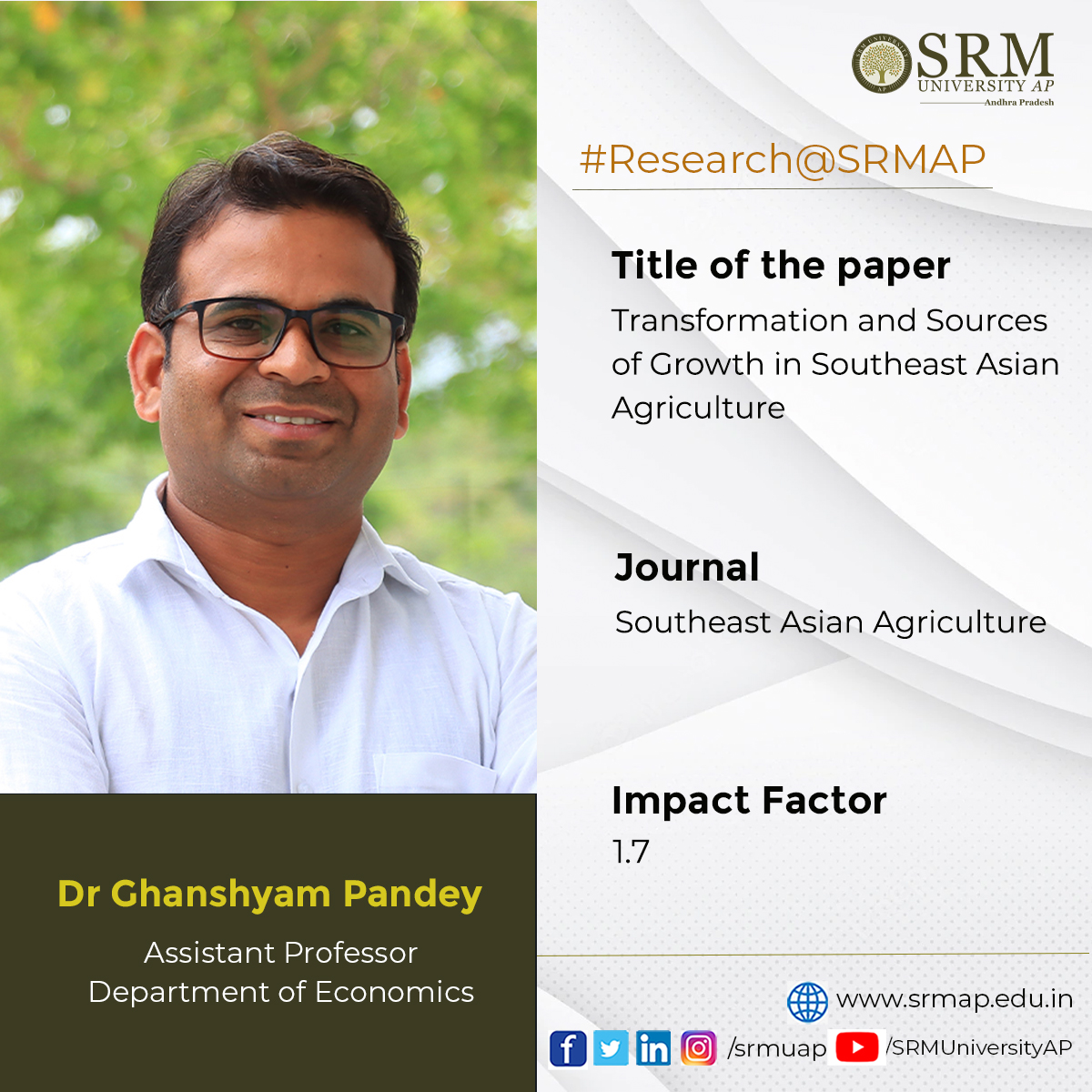
The promotion of sustainable growth of agriculture is one of the primary concerns of developing nations. The agriculture domain in Southeast Asia has undergone rapid transformation and structural changes over the last few years. Assistant Professor Dr Ghanshyam Pandey from the Department of Economics discusses the reasons for this changed scenario in his latest publication “Transformation and Sources of Growth in Southeast Asian Agriculture”. The research conducted in collaboration with International Food Policy Research (IFPRI) and the Indian Council of Agricultural Research (ICAR) was published in the Q2 journal Southeast Asian Agriculture having an Impact Factor of 1.7.
Abstract of the Research
Over the past few decades, agriculture in Southeast Asia has experienced robust growth and undergone a significant structural transformation, albeit at a different pace in different countries in the region. This paper aims to understand the agricultural transformation and growth process in Southeast Asia. The findings of this study show that driven by technological change, area expansion, and diversification, agriculture has grown faster in low-income countries in the region. In contrast, agricultural growth in high-income countries has been slow and driven by price increases, mainly of export-oriented commercial crops such as oil palm, rubber, and coconut—alongside an expansion of cropped areas under these crops. In view of the fixed supply of land and high volatility in global food prices, the area- and price-driven growth is not sustainable in the long run. For efficient, sustainable, and inclusive growth, exploiting the potential of existing and frontier technologies and diversification of production portfolios holds greater promise.
- Heartfulness Meditation Workshop September 8, 2022
The Office of International Relations and Higher Studies organised a four-day Meditation Workshop in collaboration with Heartfulness Meditation on August 26, 29, 30 and September 02, 2022, as part of the Aadigyan-Open Elective programme. The workshop introduced students to the basic lessons of the arts and science of meditation. Around 60 students participated in the training programme in 2 batches.
Hearfulness Meditation is a simple and subtle practice of meditation that connects an individual with the light and love of one’s heart. It follows the four basic steps – relax, meditate, rejuvenate, and connect – to guide oneself through a regulated path towards achieving tranquillity. Heartfulness is an essential life skill that would help one discover the sheer joy in existence.
The certified heartfulness trainers conducted sessions on the significance and essence of meditation. Students were made to practice meditation through guidance. The purpose of the programme was to develop inner strength and balance of mind to confront various challenges of life with poise and self-control. The workshop, through its premeditated pattern, will help students develop the habit of meditation and make it an integral part of their lifestyle.
- Web3: Scopes of the next generation career option in India September 8, 2022
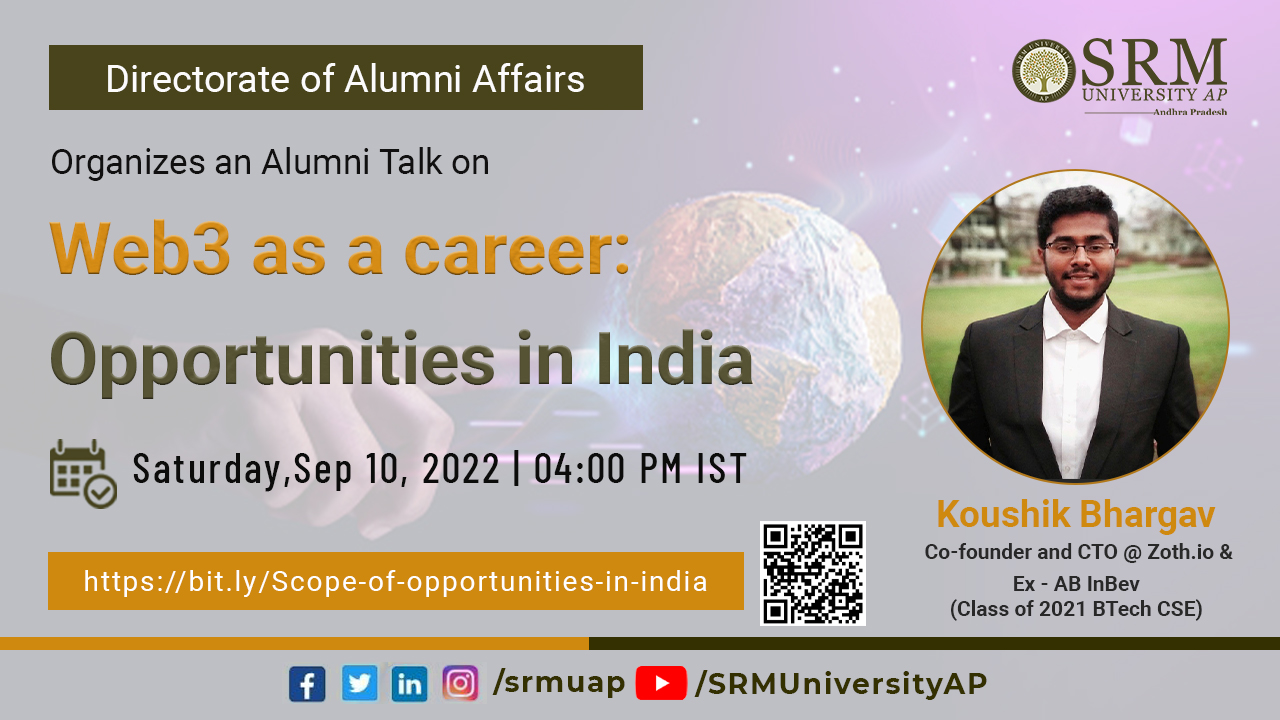 The Web we are experiencing now is entirely different from what it was ten years ago. What is the evolution process of the web? Where can we locate it tomorrow? What is the status of web3 in India? And why do all these concerns matter?
The Web we are experiencing now is entirely different from what it was ten years ago. What is the evolution process of the web? Where can we locate it tomorrow? What is the status of web3 in India? And why do all these concerns matter?The Directorate of Alumni Affairs has constantly been introducing the most trending topics of the times we live in through dynamic programmes. They are organising yet another Alumni Talk on Web3 as a career: Opportunities in India. Koushik Bhargav, the Chief Technology Officer at Zoth.io, a former BTech student of the class of 2021, will be handling the session.
Date: September 10, 2022
Time: 04.00 PM to 05.00 PM IST
Web3 is considered as the future of the internet. The web has evolved largely over the years, and the present-day applications are almost unrecognisable from its prime days. Web3 transforms the experience of being online as dramatically as PCs and smartphones did. This is why Web3 is emerging as a hot career option. It doesn’t stay static but procreates opportunities every now and then. Thus, the youth of India deserve to get immediate exposure to the widening scopes of web3.
Join the session to learn what makes web3 a promising career opportunity in India!
Continue reading → - Onam celebration at its finest September 7, 2022
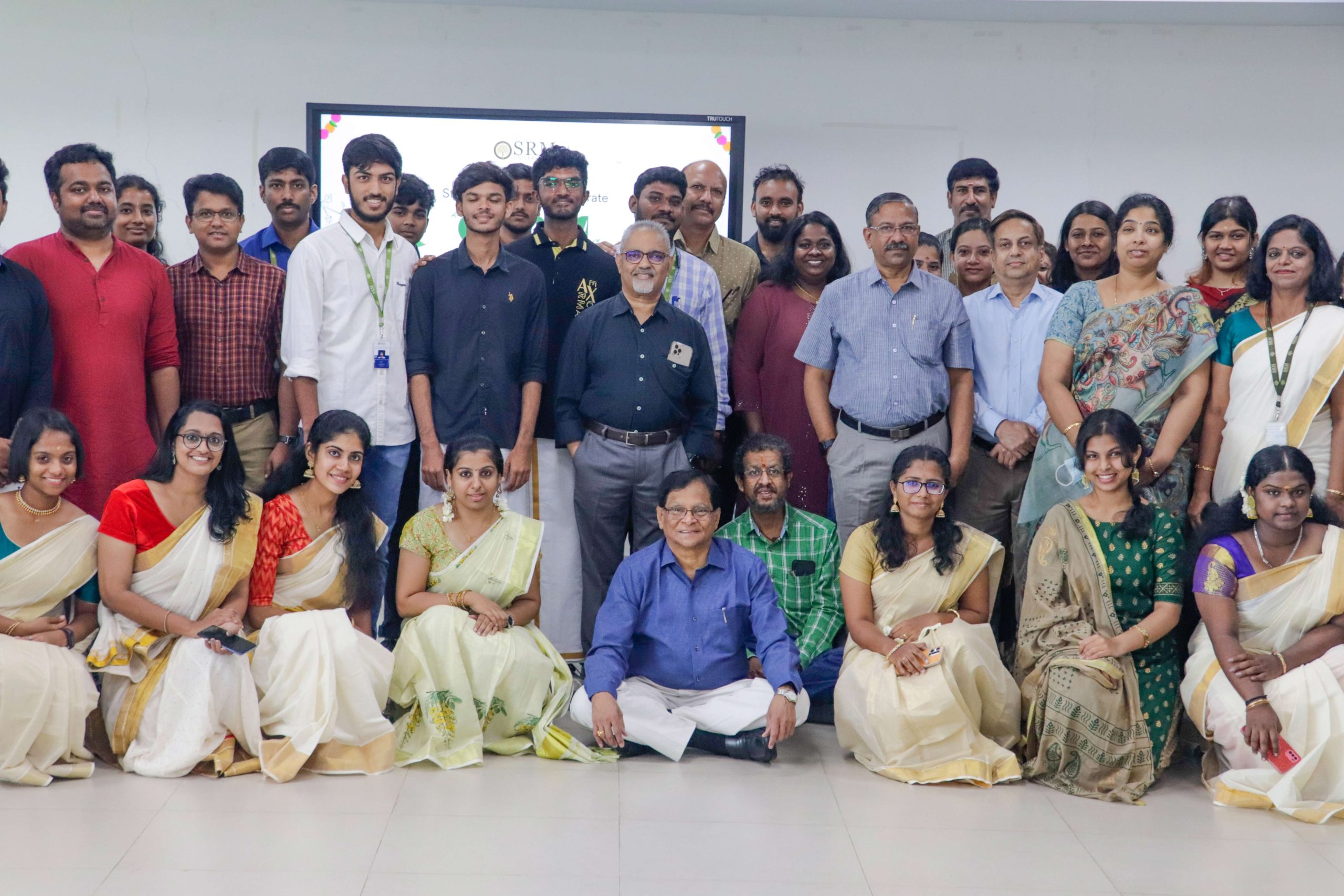 Onam is one of the grand festivals of Kerala, celebrated with ardent fervor by Malayalis all over the world every year for ten long days. Regional festivals are gaining a lot of attention beyond geographical boundaries as university campuses are getting more diverse. One of the many things that ignite the glory of SRM University- AP is the way it embraces different cultures with paramount importance. Students and Faculty of the institution got together in traditional attires on Wednesday to celebrate Onam, the harvest festival of Kerala, organised by the Department of Student Affairs.
Onam is one of the grand festivals of Kerala, celebrated with ardent fervor by Malayalis all over the world every year for ten long days. Regional festivals are gaining a lot of attention beyond geographical boundaries as university campuses are getting more diverse. One of the many things that ignite the glory of SRM University- AP is the way it embraces different cultures with paramount importance. Students and Faculty of the institution got together in traditional attires on Wednesday to celebrate Onam, the harvest festival of Kerala, organised by the Department of Student Affairs.Honorable Vice-Chancellor Prof V S Rao addressed the gathering and wished a prosperous Onam to the faculty and students. “It is an immense pleasure to celebrate Onam at a time when I am about to complete my 44 years of service in higher education”, said Prof V S Rao as he recollected his years of memories connected with Onam celebrations. Students were all ears when he described the historical scenario behind the celebration.
A large Pookkalam, welcomed students to the celebration. At the beginning of the event, a brief introduction to the historical and cultural significance of Onam was given by students. Energetic performances lifted the overall mood of the celebration. A video showcasing the exquisite aura of life in Kerala at the time of Onam was played. Payasam was distributed to all. The insights shared through the celebration for sure carved a beautiful memory of Onam in everyone.
Continue reading → - A to Z about TOFEL and GRE September 7, 2022
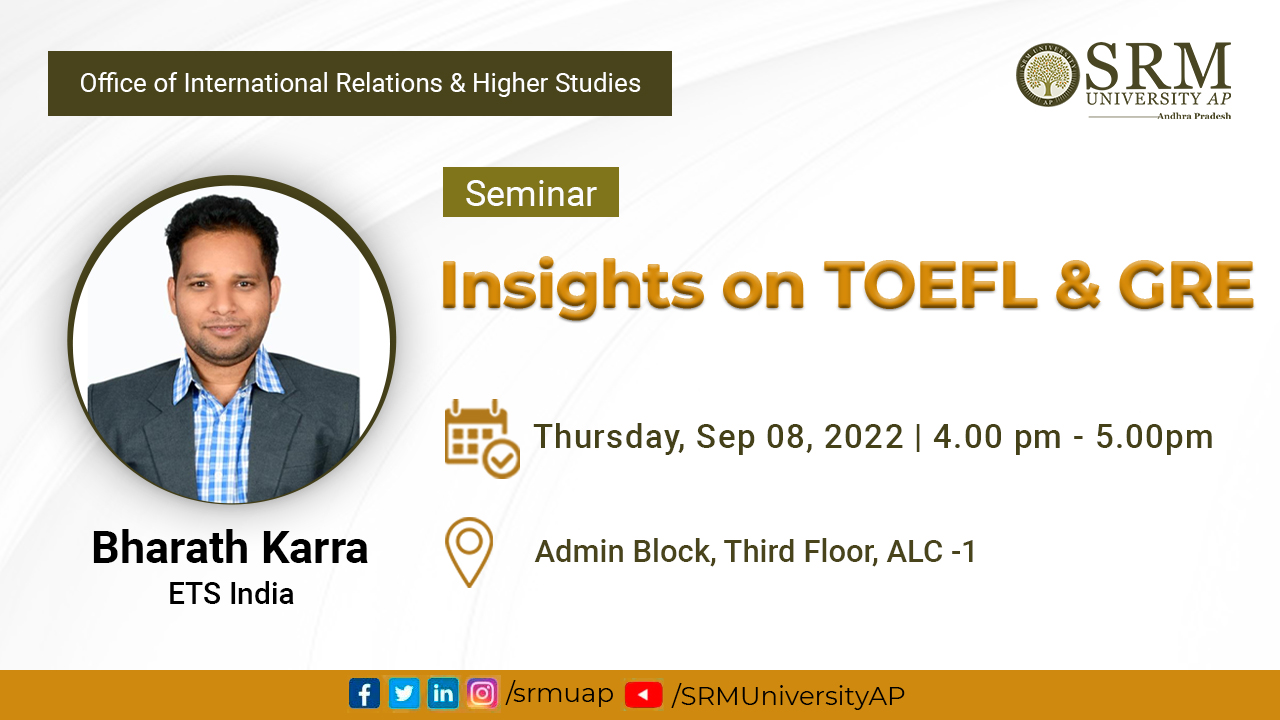 Students across the globe use TOEFL and GRE to study at top universities worldwide. These tests open the gateway to once-in-a-lifetime opportunities that can change the entire trajectory of your higher education. Many people underestimate the importance of these test scores, but they are crucial at multiple stages of higher education abroad. The Office of International Relations and Higher Studies is conducting a seminar on Insights on TOEFL & GRE to provide a detailed understanding of these tests. Bharath Karra from ETS India will be in charge of the session.
Students across the globe use TOEFL and GRE to study at top universities worldwide. These tests open the gateway to once-in-a-lifetime opportunities that can change the entire trajectory of your higher education. Many people underestimate the importance of these test scores, but they are crucial at multiple stages of higher education abroad. The Office of International Relations and Higher Studies is conducting a seminar on Insights on TOEFL & GRE to provide a detailed understanding of these tests. Bharath Karra from ETS India will be in charge of the session.Date: September 08, 2022
Time: 04.00 PM to 05.00 PM
Venue: Admin Block, Third Floor, ALC-1
The test scores help students get an edge over others while grabbing the best internship opportunities from top global companies. They are the ultimate panacea for all the concerns related to higher studies abroad. These scores are compared to make a final decision whenever there comes an assession between equal talents. They are criteria that determine your abilities to study and contribute to the country’s growth. A broader vision of these major tests will be instrumental in taking your career to a new level.
About the speaker
Bharath Karra is currently working at ETS India, handling TOFEL and GRE products for Andhra Pradesh and Telangana Regions. He has worked in organisations like Thinkcell Learning Solutions Pvt Ltd, Logiquest, and IDP Education India PVT Ltd. He got his Post Graduation in Management from Osmania university and has been working in the higher education space, handling the domestic and abroad education market.
Join the seminar and learn A to Z about TOFEL and GRE!
Continue reading → - SRM University-AP celebrates Founders Day September 6, 2022
- Youth Leadership event organised by SRM AP September 6, 2022
Financial-Express – August 30
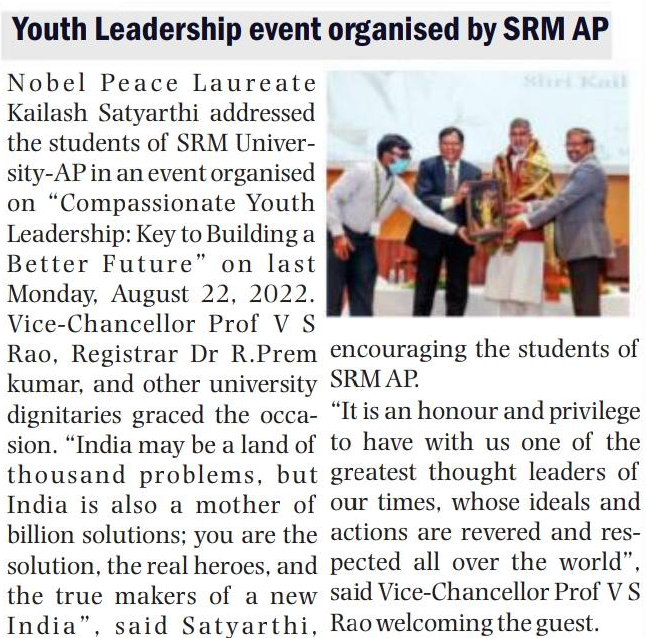
The-New-Indian-Express – August 29
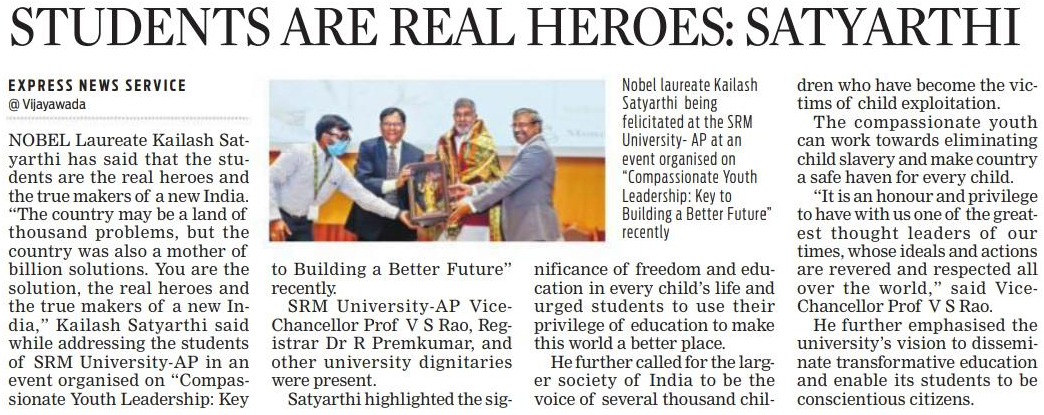
Financial-Express – August 27
The-Hindu – August 23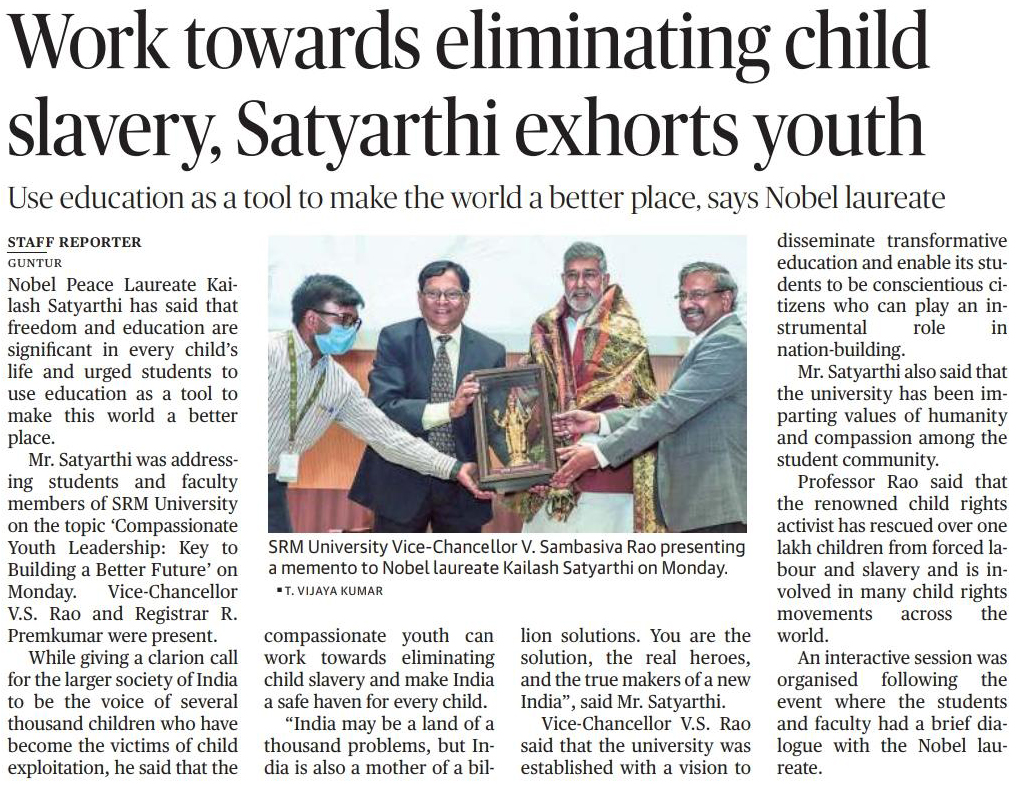
Deccan-Chronicle – August 23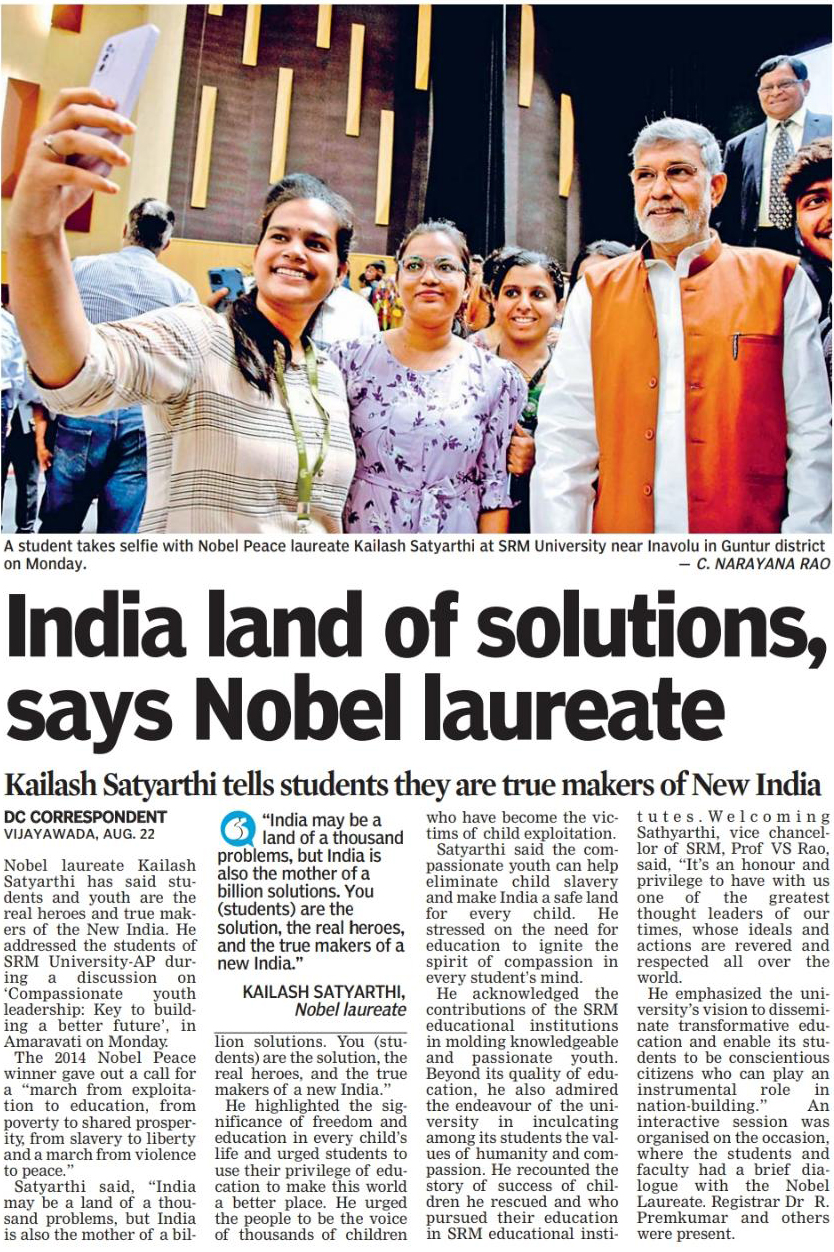
The-Hans-India – August 23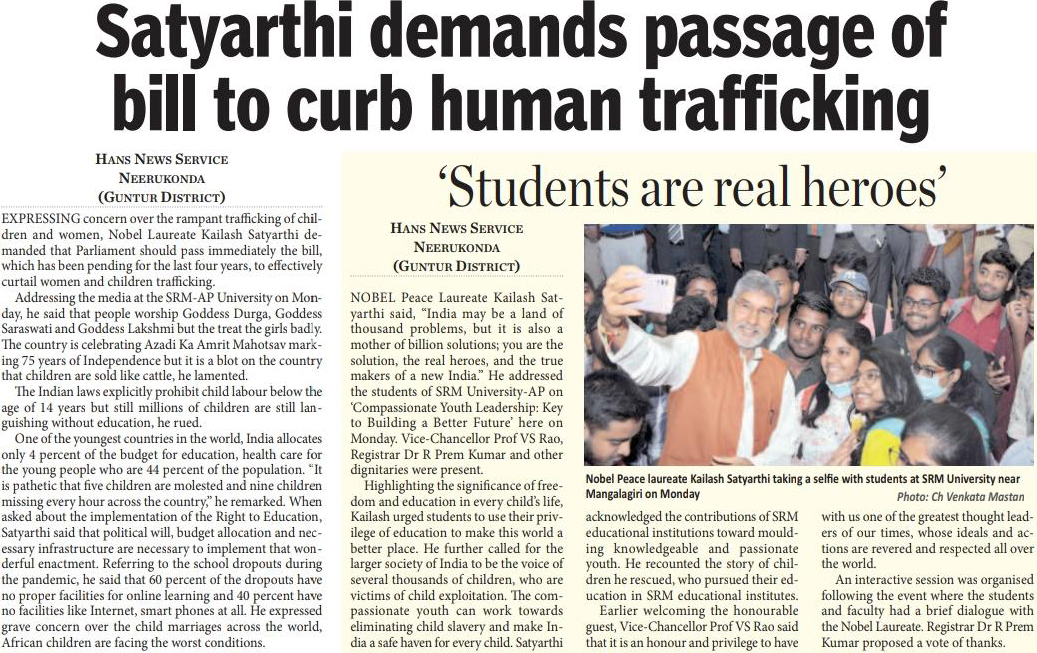
The-Pioneer – August 23
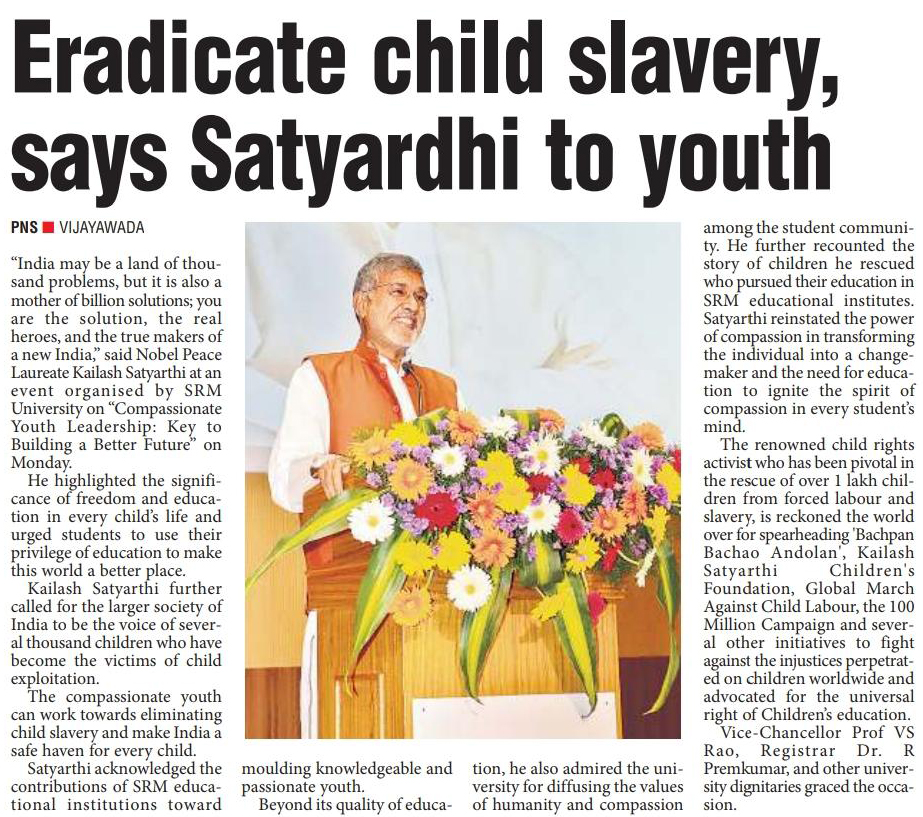
The-New-Indian-Express – August 23
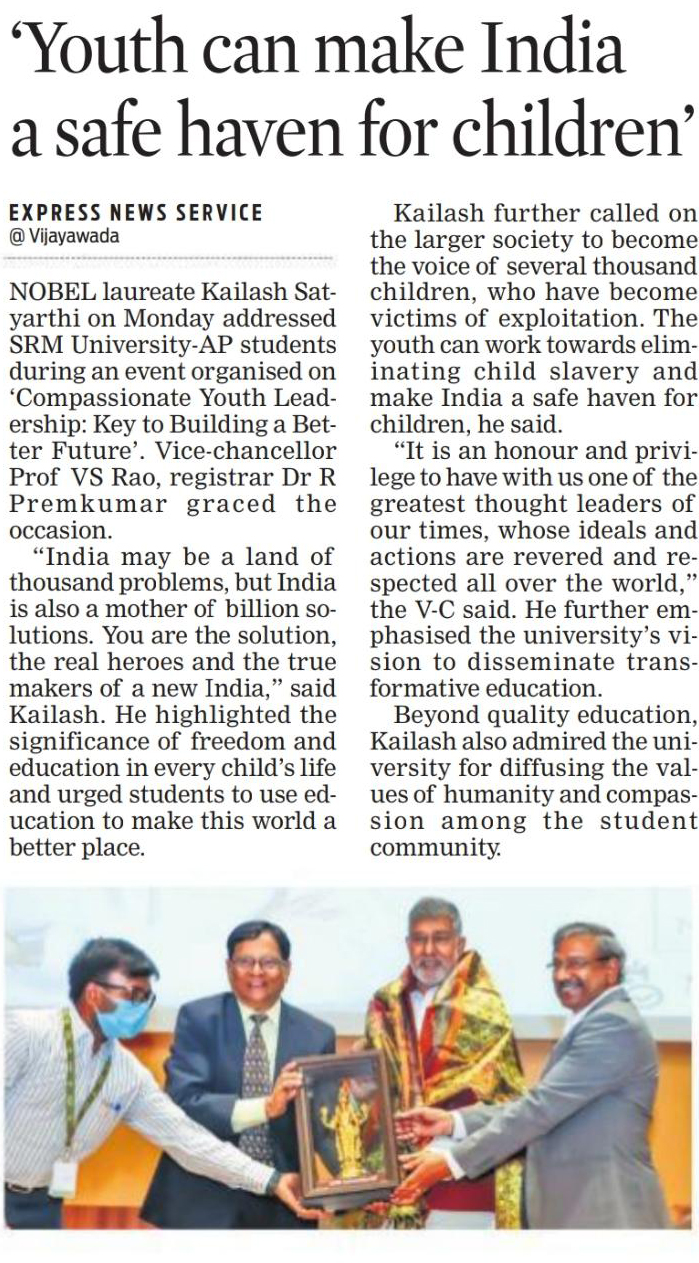
Arth-Parkash – August 24
Continue reading →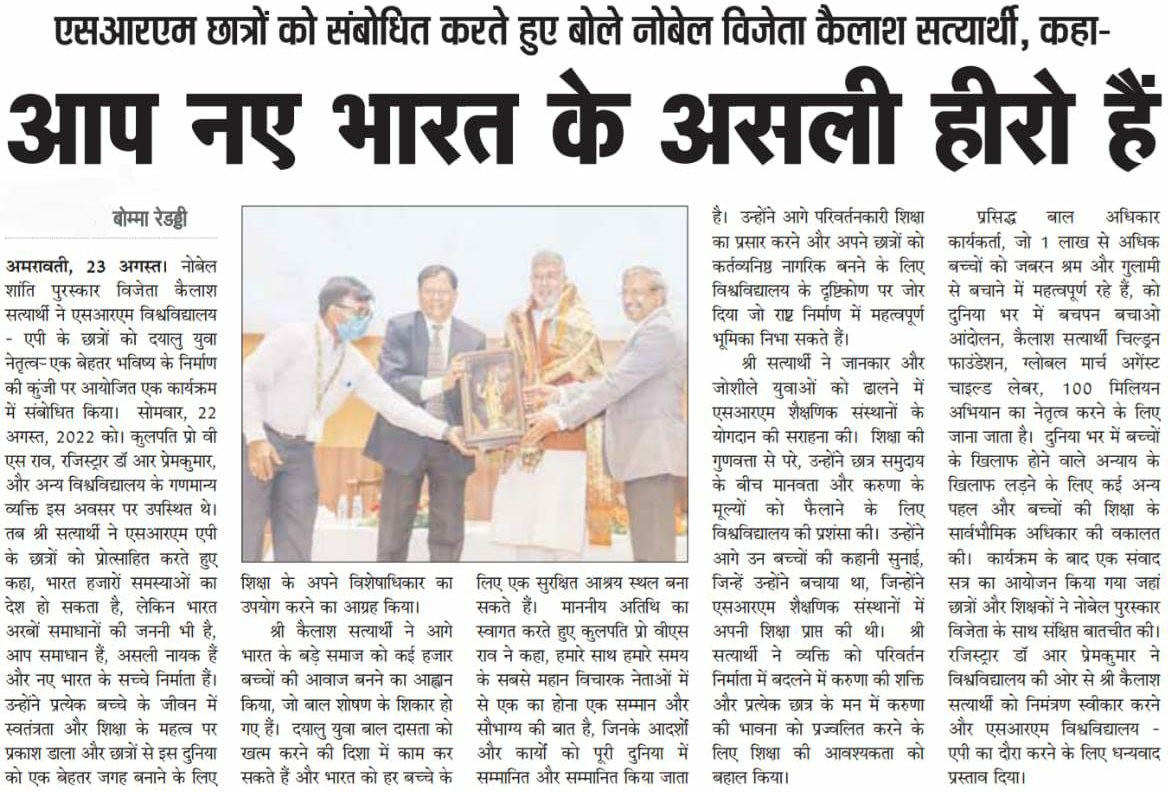
- The Hindu SRM-AP to hold conclave on NEP September 6, 2022


